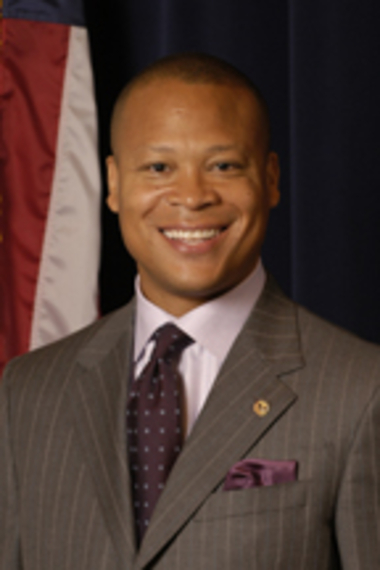Black churches key to Illinois gay marriage debate

SOPHIA TAREEN, Associated Press
SUMMIT, Ill. (AP) — When a proposal to legalize gay marriage started gaining momentum in the home state of President Barack Obama, it seemed a quick and easy deal: The pastor of his former megachurch endorsed it with powerful testimony at the Capitol and Democrats control Illinois' government.
But fervor over the idea has stalled for months in that exact spot where faith and politics are inseparable.
Black churches — where the pulpit has always been political — are deeply divided over their support for same-sex marriage and are central to the Illinois measure's passage, which awaits a House vote as early as this week. On either side of the issue, pastors and politically active congregations have waged intense campaigns with robocalls, columns and sermons.
"The soup always boils just before it's done and the soup is boiling now," said the Rev. Phyllis Pennese, an openly gay pastor who runs a tiny congregation for black gay, lesbian and transgendered people in the Chicago suburb of Summit. "That's why there's all this fury around this issue because it's almost about to be done."
Pennese, 56, is the daughter of an Italian immigrant father and black mother, and says the bill is a matter of equality and civil rights. At the time her parents married, interracial unions weren't encouraged and she doesn't see a difference when it comes to gay marriage.
For a decade, she's preached that love supersedes all at her church, Pillar of Love," where gender signs on the bathroom doors have been purposely removed.
"Love is very powerful," she said. "Check your Scriptures. Love, grace, mercy and compassion and justice always trump law in the eyes of Jesus."
But the other side of the debate features fierce opposition from pastors, including former state Sen. James Meeks. His Salem Baptist Church, with its 10,000-seat arena, is a sought-after stopping point for politicians. His coalition targeting black lawmakers' territories with robocalls saying marriage is between a man and woman.
"In my view, same-sex marriage should not be the law of the state of Illinois," Meeks says in the call, before instructing the recipient to call his or her representative.
The Senate passed a proposal allowing gay marriage on Valentines' Day, and Democratic Gov. Pat Quinn is in favor of the measure. The House — expected to take it up before May 31 adjournment — requires 60 votes.
For weeks, sponsors have said they're close. With two Republicans on board, unofficial tallies hover around 60.
But advocates who wanted Illinois to be the 10th state to allow same-sex marriage have watched state legislatures in Rhode Island, Delaware and Minnesota pass them. That's put the 20 members of the House Black Caucus, all Democrats mostly around Chicago, in an uncomfortable spotlight at a time when Illinois faces disastrous financial problems, including unprecedented pension debt.
Chicago Rep. Ken Dunkin, among the vocal caucus members in support of gay marriage, said he receives calls daily. Others evade the question, suggesting a fear of backlash.
Rep. Will Davis of Homewood remains "really undecided."
"I'm probably getting as many calls on this issue as I am on pensions," Davis said. When asked if he was worried about it affecting his political future he said, "I'm trusting that my constituents are not one-dimensional."
Black congregations have grappled with gay marriage since the nation's first black president publicly said he supported it a year ago. His stance affected Illinois politicians, including Quinn, and pastors in favor boast the support of the Rev. Otis Moss III, even though Obama no longer attends Chicago's Trinity United, which has roughly 8,500 members.
Earlier this year, Moss gave such impassioned testimony in Springfield that it caused at least one lawmaker's jaw to drop.
While polls show public opinion on gay marriage is rapidly shifting in favor — even the former head of the Illinois GOP supports it — pastors against it say it's not a uniform view, especially among their congregations.
Traditional black churches have been an organizing front in civil rights struggles, embraced Democratic Party ideals and been key to get-out-the-vote efforts. Political candidates in Illinois — where Democrats hold supermajorities in both chambers — won't run for higher office without campaigning at black churches.
At the same time, they're socially conservative.
"The dilemma exists in a lot of churches, it's particularly intense among black churches because of the history of civil rights," said John Green, a political science professor at the University of Akron. "Unlike white churches, black churches have a much longer history of political activity and many in the church are pleased to take cues (from a pastor)."
For many who disagree with gay marriage, the civil rights argument is frustrating.
Bishop Lance Davis, who leads the roughly 500-member New Zion Christian Fellowship Church of Dolton, said blacks have fought for equality for the right to live as human beings, something he's not convinced has been fully actualized.
"You can't compare the two," he said, citing the well-organized gay marriage advocacy in Illinois. "I feel that those gays and lesbians have more power than I do. Have more rights than I do. More freedoms than I do."
That's not how the Rev. Bernard Jakes of the roughly 800-member member West Point Missionary Baptist Church in Chicago sees it.
"Black people do not hold the title of civil rights because of what happened in the '60s. They must take a look at the legal definition," he said. The debate led him to write a pro-gay marriage column for a religious magazine.
"Being able to articulate to the congregation why this is a matter for social justice, it goes way beyond a matter of spirituality," he said.
__
Contact Sophia Tareen at https://www.twitter.com/sophiatareen
Copyright 2013 The Associated Press.





